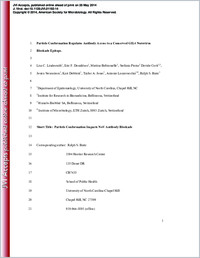Particle conformation regulates antibody access to a conserved GII.4 norovirus blockade epitope
- Lindesmith, Lisa C. Department of Epidemiology, University of North Carolina, Chapel Hill, North Carolina, USA
- Donaldson, Eric F. Department of Epidemiology, University of North Carolina, Chapel Hill, North Carolina, USA
- Beltramello, Martina Institute for Research in Biomedicine (IRB), Faculty of Biomedical Sciences, Università della Svizzera italiana, Switzerland
- Pintus, Stefania Institute for Research in Biomedicine (IRB), Faculty of Biomedical Sciences, Università della Svizzera italiana, Switzerland
- Corti, Davide Institute for Research in Biomedicine (IRB), Faculty of Biomedical Sciences, Università della Svizzera italiana, Switzerland - Humabs BioMed SA, Bellinzona, Switzerland
- Swanstrom, Jesica Department of Epidemiology, University of North Carolina, Chapel Hill, North Carolina, USA
- Debbink, Kari Department of Epidemiology, University of North Carolina, Chapel Hill, North Carolina, USA
- Jones, Taylor A. Department of Epidemiology, University of North Carolina, Chapel Hill, North Carolina, USA
- Lanzavecchia, Antonio Institute for Research in Biomedicine (IRB), Faculty of Biomedical Sciences, Università della Svizzera italiana, Switzerland - Institute of Microbiology, ETH Zurich, Zurich, Switzerland
- Baric, Ralph S. Department of Epidemiology, University of North Carolina, Chapel Hill, North Carolina, USA
-
22.07.2014
Published in:
- Journal of virology. - 2014, vol. 88, no. 16, p. 8826-8842
English
GII.4 noroviruses (NoVs) are the primary cause of epidemic viral acute gastroenteritis. One primary obstacle to successful NoV vaccination is the extensive degree of antigenic diversity among strains. The major capsid protein of GII.4 strains is evolving rapidly, resulting in the emergence of new strains with altered blockade epitopes. In addition to characterizing these evolving blockade epitopes, we have identified monoclonal antibodies (MAbs) that recognize a blockade epitope conserved across time-ordered GII.4 strains. Uniquely, the blockade potencies of MAbs that recognize the conserved GII.4 blockade epitope were temperature sensitive, suggesting that particle conformation may regulate functional access to conserved blockade non-surface- exposed epitopes. To map conformation-regulating motifs, we used bioinformatics tools to predict conserved motifs within the protruding domain of the capsid and designed mutant VLPs to test the impacts of substitutions in these motifs on antibody cross-GII.4 blockade. Charge substitutions at residues 310, 316, 484, and 493 impacted the blockade potential of cross-GII.4 blockade MAbs with minimal impact on the blockade of MAbs targeting other, separately evolving blockade epitopes. Specifically, residue 310 modulated antibody blockade temperature sensitivity in the tested strains. These data suggest access to the conserved GII.4 blockade antibody epitope is regulated by particle conformation, temperature, and amino acid residues positioned outside the antibody binding site. The regulating motif is under limited selective pressure by the host immune response and may provide a robust target for broadly reactive NoV therapeutics and protective vaccines.
- Language
-
- English
- Classification
- Medicine
- License
-
License undefined
- Open access status
- green
- Identifiers
-
- RERO DOC 324291
- DOI 10.1128/JVI.01192-14
- ARK ark:/12658/srd1318986
- Persistent URL
- https://n2t.net/ark:/12658/srd1318986
Statistics
Document views: 166
File downloads:
- Texte intégral: 201
